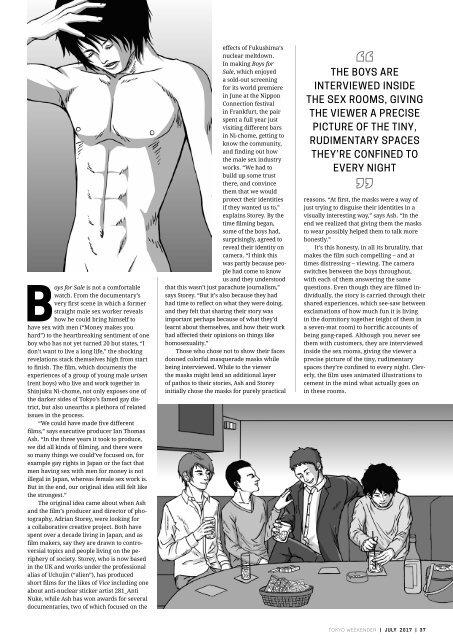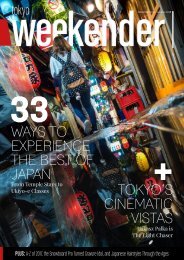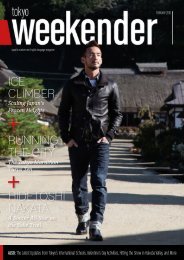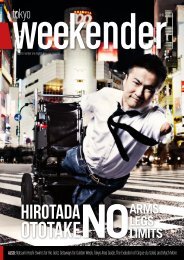Tokyo Weekender July 2016
Breaking the rules of kimono – a new book shatters antiquated views of this traditional garment. Plus: The boys for sale in Shinjuku Ni-chome, best sake of 2017, Japan's new emperor, and what really goes on inside "Terrace House."
Breaking the rules of kimono – a new book shatters antiquated views of this traditional garment. Plus: The boys for sale in Shinjuku Ni-chome, best sake of 2017, Japan's new emperor, and what really goes on inside "Terrace House."
Create successful ePaper yourself
Turn your PDF publications into a flip-book with our unique Google optimized e-Paper software.
Boys for Sale is not a comfortable<br />
watch. From the documentary’s<br />
very first scene in which a former<br />
straight male sex worker reveals<br />
how he could bring himself to<br />
have sex with men (“Money makes you<br />
hard”) to the heartbreaking sentiment of one<br />
boy who has not yet turned 20 but states, “I<br />
don’t want to live a long life,” the shocking<br />
revelations stack themselves high from start<br />
to finish. The film, which documents the<br />
experiences of a group of young male urisen<br />
(rent boys) who live and work together in<br />
Shinjuku Ni-chome, not only exposes one of<br />
the darker sides of <strong>Tokyo</strong>’s famed gay district,<br />
but also unearths a plethora of related<br />
issues in the process.<br />
“We could have made five different<br />
films,” says executive producer Ian Thomas<br />
Ash. “In the three years it took to produce,<br />
we did all kinds of filming, and there were<br />
so many things we could’ve focused on, for<br />
example gay rights in Japan or the fact that<br />
men having sex with men for money is not<br />
illegal in Japan, whereas female sex work is.<br />
But in the end, our original idea still felt like<br />
the strongest.”<br />
The original idea came about when Ash<br />
and the film’s producer and director of photography,<br />
Adrian Storey, were looking for<br />
a collaborative creative project. Both have<br />
spent over a decade living in Japan, and as<br />
film makers, say they are drawn to controversial<br />
topics and people living on the periphery<br />
of society. Storey, who is now based<br />
in the UK and works under the professional<br />
alias of Uchujin (“alien”), has produced<br />
short films for the likes of Vice including one<br />
about anti-nuclear sticker artist 281_Anti<br />
Nuke, while Ash has won awards for several<br />
documentaries, two of which focused on the<br />
effects of Fukushima’s<br />
nuclear meltdown.<br />
In making Boys for<br />
Sale, which enjoyed<br />
a sold-out screening<br />
for its world premiere<br />
in June at the Nippon<br />
Connection festival<br />
in Frankfurt, the pair<br />
spent a full year just<br />
visiting different bars<br />
in Ni-chome, getting to<br />
know the community,<br />
and finding out how<br />
the male sex industry<br />
works. “We had to<br />
build up some trust<br />
there, and convince<br />
them that we would<br />
protect their identities<br />
if they wanted us to,”<br />
explains Storey. By the<br />
time filming began,<br />
some of the boys had,<br />
surprisingly, agreed to<br />
reveal their identity on<br />
camera. “I think this<br />
was partly because people<br />
had come to know<br />
us and they understood<br />
that this wasn’t just parachute journalism,”<br />
says Storey. “But it’s also because they had<br />
had time to reflect on what they were doing,<br />
and they felt that sharing their story was<br />
important perhaps because of what they’d<br />
learnt about themselves, and how their work<br />
had affected their opinions on things like<br />
homosexuality.”<br />
Those who chose not to show their faces<br />
donned colorful masquerade masks while<br />
being interviewed. While to the viewer<br />
the masks might lend an additional layer<br />
of pathos to their stories, Ash and Storey<br />
initially chose the masks for purely practical<br />
THE BOYS ARE<br />
INTERVIEWED INSIDE<br />
THE SEX ROOMS, GIVING<br />
THE VIEWER A PRECISE<br />
PICTURE OF THE TINY,<br />
RUDIMENTARY SPACES<br />
THEY’RE CONFINED TO<br />
EVERY NIGHT<br />
reasons. “At first, the masks were a way of<br />
just trying to disguise their identities in a<br />
visually interesting way,” says Ash. “In the<br />
end we realized that giving them the masks<br />
to wear possibly helped them to talk more<br />
honestly.”<br />
It’s this honesty, in all its brutality, that<br />
makes the film such compelling – and at<br />
times distressing – viewing. The camera<br />
switches between the boys throughout,<br />
with each of them answering the same<br />
questions. Even though they are filmed individually,<br />
the story is carried through their<br />
shared experiences, which see-saw between<br />
exclamations of how much fun it is living<br />
in the dormitory together (eight of them in<br />
a seven-mat room) to horrific accounts of<br />
being gang-raped. Although you never see<br />
them with customers, they are interviewed<br />
inside the sex rooms, giving the viewer a<br />
precise picture of the tiny, rudimentary<br />
spaces they’re confined to every night. Cleverly,<br />
the film uses animated illustrations to<br />
cement in the mind what actually goes on<br />
in these rooms.<br />
TOKYO WEEKENDER | JULY 2017 | 37
















